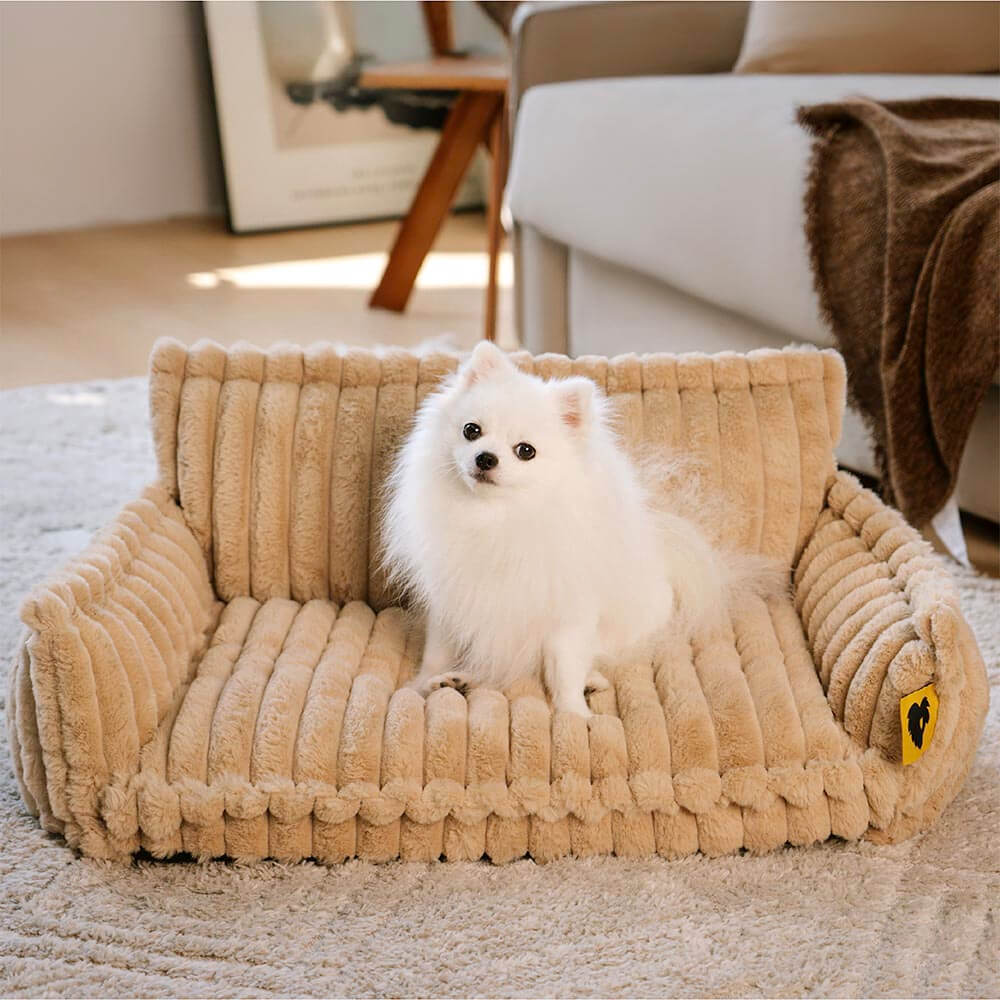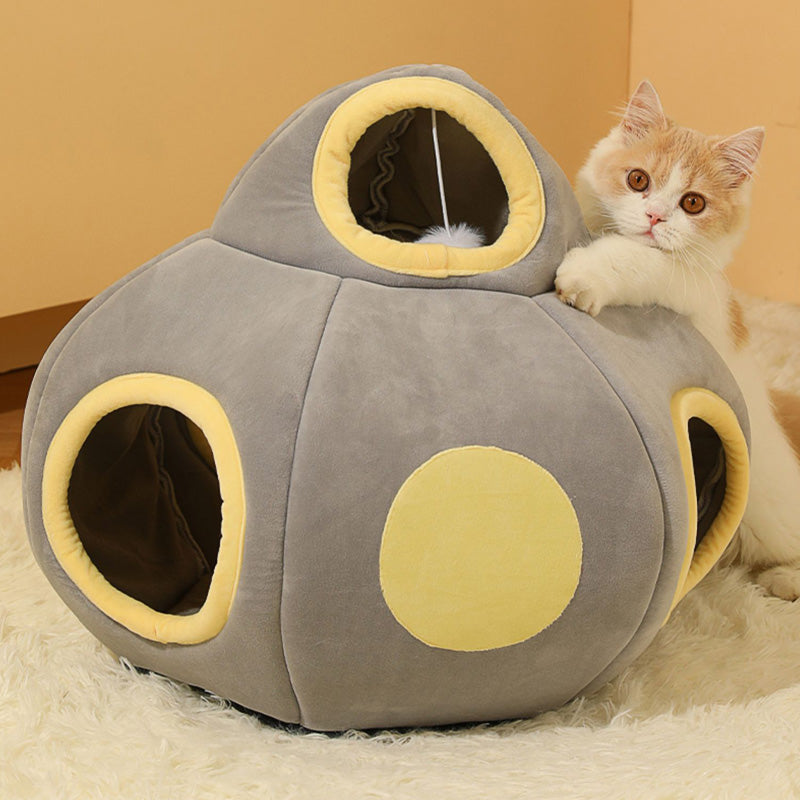Choosing the right bed for your dog isn’t just about comfort—it’s essential for their health and well-being. Just like humans, dogs have their own preferences when it comes to sleeping surfaces, influenced by their size, age, and overall needs. Whether your furry friend prefers a soft plush bed or a firmer elevated option, understanding these preferences can help you find the best dog bed for them.
In this guide, we’ll explore the benefits of hard vs. soft beds and highlight the features of different types of dog beds to make your choice easier.

Why It Matters: Choosing the Right Dog Bed for Your Pet’s Health and Comfort
When it comes to choosing the perfect dog bed plush, it’s not just about comfort—it's about your pet’s overall health and security. A well-chosen bed ensures your dog sleeps soundly, supports their joints, and provides a sense of safety. For many customers, the decision of what bed to buy goes beyond aesthetics; it directly impacts their dog’s well-being, especially for senior dogs or breeds with health concerns.
As one of the most trusted sellers of dog beds, FunnyFuzzy understands that every dog has unique needs. Whether you're looking for a soft, supportive bed for a growing puppy or a firm orthopedic option for an older dog, the right choice is essential. This is why so many pet owners choose to order beds that provide the right balance of comfort, support, and durability.
Taking the time to find the best bed for your dog is worth every moment, as it leads to a happier, healthier pet and fewer vet visits down the line. When you invest in a high-quality, supportive dog bed, you're making a long-term commitment to your dog’s comfort and peace of mind.
Dog Bed Preferences
Research on Whether Dogs Prefer Hard or Soft Surfaces for Sleeping
Several studies have aimed to determine whether dogs generally prefer sleeping on hard or soft surfaces. A 2014 study published in the Journal of Veterinary Behavior surveyed a group of dogs exposed to hard and soft beds. They found the majority of dogs preferred the softer bedding, spending significantly more time on cushioned surfaces. However, they noted factors like age, body condition, and history of joint issues influenced individual preferences.
Other research has focused on pressure point mapping. A 2012 study by CertiPUR-US used a sensor mat to map dogs' pressure points and movements during sleep. They found that foam beds better distributed the dogs' weight and reduced pressure points compared to harder surfaces. This indicates softer beds may provide more orthopedic support.
It Depends on the Dog!
While the research gives us clues, each dog has unique preferences shaped by various factors:
-
Age: Older dogs or those with arthritis may prefer cushioned beds that relieve joint pressure. Puppies remain flexible and may enjoy firmer surfaces.
-
Breed: Certain breeds prone to joint issues like hip dysplasia may prefer softer beds that reduce impact. Breeds with thinner fur coats often like the warmth of plush beds.
-
Health: Dogs with orthopedic issues need more support from firmer, memory foam beds. Orthopaedic dog beds, often made from memory foam, are ideal for relieving joint pain and ensuring proper weight distribution.
-
Habits: Dogs that sprawl out may enjoy larger, softer beds with space to stretch. Nesters prefer snug beds with high-walled support.
-
Temperature: Dogs that overheat favor cooling gel beds, whereas dogs that get cold appreciate fluffy dog beds with plush, insulated materials.
Consider your dog's unique circumstances to predict their ideal bed softness and support level.
Hard Beds vs. Soft Beds: What Do Dogs Prefer?
The answer depends on your dog’s size, age, health, and sleeping habits. Let’s break it down:

Soft Beds for Ultimate Comfort
Soft, plush dog beds are ideal for:
-
Small dogs or puppies who love to sink into a cozy surface.
-
Anxious dogs who feel comforted by a calming dog bed with a familiar scent.
-
Dogs with joint pain or arthritis, especially senior dogs who benefit from the pressure relief offered by memory foam beds.

FunnyFuzzy's Soft Double Layer Dog Bed
Hard or Elevated Beds for Support
Firmer beds, including elevated dog beds, work well for:
-
Large breed dogs like German Shepherds, who need extra support for their weight.
-
Dogs who prefer air circulation during warmer months or when lounging outdoors.
-
Aggressive chewers who might damage softer options.
Raised dog beds are another great option for dogs needing better air circulation, especially during warmer months or outdoor use.
Features to Look For in the Best Dog Beds
Not all beds are created equal. Here are some essential features to consider:
1. Memory Foam for Joint Support
For older dogs or those with joint problems, memory foam dog beds relieve pressure and promote better sleep. Look for options with a waterproof inner liner to protect the foam.
2. Machine Washable Covers
Life with a dog can get messy. A machine washable cover, such as stretchy sofa covers, makes cleaning incredibly easy. These covers can effortlessly fit different shapes, ensuring convenience and a snug fit. For crate-trained dogs, a sturdy dog crate bed offers comfort and easy maintenance.
3. Waterproof Beds
Dogs who love the outdoors or have accidents will benefit from a waterproof dog bed. These beds protect the inner materials while ensuring longevity. Outdoor dog beds, designed with waterproof and durable materials, are perfect for pets who enjoy spending time outside.
4. Elevated Beds for Fresh Air
An elevated dog bed is perfect for warmer days or dogs who spend time outside. These beds improve air circulation and keep dogs cool and comfortable.

5. Durable Materials
If your dog tends to chew or scratch their bed, opt for models made with durable fabrics like stretch sofa covers. These covers not only resist wear and tear but also provide flexibility for easy maintenance and replacement. A non-slip base adds extra stability for energetic pups.
FunnyFuzzy's Orthopaedic Dog Bed
Choosing the Right Bed for Your Dog’s Needs
Your dog’s unique characteristics will determine the type of bed they’ll love. Here are some tailored recommendations:
For Small Dogs and Puppies
Look for a super soft bed with a plush surface to provide warmth and security. Beds with a washable cover are ideal for easy cleaning.
For Medium-Sized Dogs
For medium sized breeds, choosing a medium dog bed with ample cushioning and support ensures comfort.
For Large Breeds
Choose a supportive memory foam bed or an elevated dog bed designed to relieve pressure and promote comfort for their joints. Options with a waterproof inner liner ensure durability.
For Anxious or Senior Dogs
A donut dog bed can help anxious dogs feel safe. For older pups, a bed that offers additional support with two layers of foam is ideal.
FAQs About Dog Beds
Do dogs prefer hard or soft beds?
It depends! Some dogs love the coziness of a plush dog bed, while others prefer the firmness of an elevated bed. Factors like age, breed, and health play a role in their preference.
What is the best bed for large breed dogs?
For large breeds, a memory foam dog bed or elevated dog bed provides the best support. These beds alleviate pressure on joints and ensure a comfortable rest.
Are waterproof dog beds worth it?
Absolutely! Waterproof beds are perfect for dogs prone to accidents or those who enjoy the outdoors. They’re easy to clean and protect the inner materials.
Conclusion
While most dogs love softness, individuals need support or cushioning based on factors like age and joint health. Both hard and soft beds have pros and cons. Observe your dog's unique needs and preferences when choosing the perfect sleep spot! Prioritize support, comfort, and durability to create their ideal bedtime oasis. With the right bed, you'll both be sleeping soundly!





